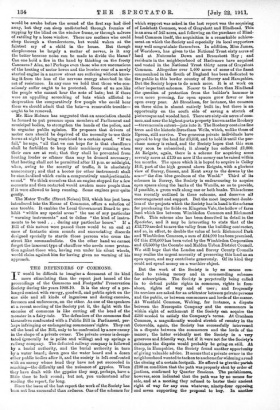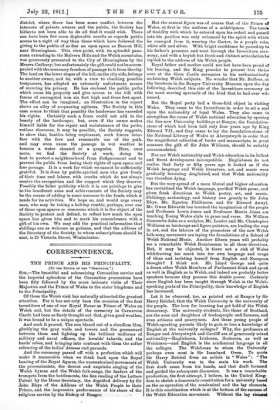THE DEFENDERS OF COMMONS.
IT would be difficult to imagine a document of its kind more stimulating than the report just issued of the proceedings of the Commons and Footpaths' Preservation Society during the years 1908-10. It is the story of a pro- longed contest with energy, goodwill, and public spirit on the one side and all kinds of ingenious and daring enemies, foreseen and unforeseen, on the other. As one of the speakers at a recent meeting of the Society put it, the fight with the enemies of commons is like cutting off the head of the monster in a fairy-tale. The defenders of the commons find themselves confronted with a Public Bill in Parliament, per- imps infringing or endangering commoners' rights. They cut off the head of the Bill, only to he confronted by anew enemy in the shape of a private owner. The private owner is decapi- tated (generally he is polite and willing) and up springs a railway company. The defeated railway company is followed by a burial authority, and the burial authority in turn by a water board; down goes the water board and a dozen other public bodies after it, and the society is left confronted with an enemy whose head they have not yet succeeded in reaching—the difficulty and the nuisance of gypsies. When they have dealt with the gypsies they may, perhaps, have a little time to look round; but not, you understand after reading the report, for long.
Since the issue of the last report, the -work of the Society has been not less successful than arduous. One of the schemes for which support was asked in the last report was the acquiring of Ludshott Common, west of Grayshott and Hindhead. This is an area of 542 acres, and following on the purchase of Hind- head Common itself, the acquisition is a remarkable achieve- ment on which the Society and especially its local supporters may well congratulate themselves. In addition, Miss James, of We,std.own, has given to the National Trust sixty acres of land at Nutcomlee Down and Bramshott Hey ; and residents in the neighbourhood of Ha,slemere have acquired and vested in the National Trust thirty acres of Grayshott Common. Altogether over 1,400 acres of some of the finest commouland in the South of England has been dedicated to the public in this border country of Surrey and Hampshire. But the Society hopes to do much more. It is at work on other important schemes. Nearer to London than Hindhead the question of protection from the builder's hammer is even more pressing, for open spaces grow fewer or less open every year. At Streatham, for instance, the common on three sides is almost entirely built in; but there is an opportunity on the south side of saving a stretch of picturesque and wooded land. There are sixty-six acres of com- mon, and near the highest parte property known asthe Rookery —three acres in extent—juts into it. The Rookery contains fine trees and the historic Streatham Wells, which, unlike those of Epsom, still survive. Two generous private individuals have agreed to buy the land for £3,000, and to hold it until the pur- chase money is raised, and the Society hopes that this sum may soon be subscribed; it already has collected 21,000. At Reigate, again, there is a scheme for acquiring some seventy acres at 2130 an acre if the money can be raised within ten months. The space which it is hoped to acquire is Colley Hill, part of the high ground above Reigate, with a glorious view of Surrey, Sussex, and Kent away to the downs by the sea—" the dim blue goodness of the Weald." Third of its schemes in Surrey, the Society is endeavouring to acquire open spaces along the banks of the Wandle, so as to provide, if possible, a green walk along one or both banks. This scheme was recently outlined in these columns, and deserves all encouragement and support. But the most important doubt- less of the projects which the Society has in hand is the scheme for purchasing the fields on Kingston Vale, the hollow of farm land which lies between Wimbledon Common and Richmond Park. This scheme also has been described in detail in the Spectator, and it may be interesting to state that of the 252,770 needed to save the valley from the building contractor, and so, in effect, to double the value of both Richmond Park and Wimbledon Common, a sum of 224,000 has been promised. Of this £10,000 has been voted by the Wimbledon Corporation and 23,500 by the Coombe and Malden -Urban District Council. We still hope that the London and Surrey County Councils may realize the urgent necessity of preserving this land as an open space, and may contribute generously. Of its kind they could not spend money on a worthier object.
But the work of the Society is by no means con- fined to raising money and in commending schemes for subscription. The Society is perpetually being called hi to defend public rights in commons, rights in fore- shore, rights of way and of user ; and frequently its services are asked for as arbitrator between private persons and the public, or between commoners and lords of the manor. At Westfield Common, Woking, for instance, a dispute between the Necropolis Company and the commoners is within sight of settlement if the Society can acquire the £200 needed to satisfy the Company's terms- At Cranham Common, a magnificently wooded stretch of country in the Cotswolds, again, the Society has successfully intervened in a, dispute between the commoners and the lords of the manor; the latter evidently met the Society in a very generous and friendly way, but if it were not for the Society's existence the dispute would probably be going on still. At Steep, in Hampshire, the Society found another opportunity of giving valuable advice. It seems that a private owner in the neighbourhood wanted to tack on to a scheme for widening a road the closing of a certain footpath. He offered to give the pariah 2100 on condition that the path was properly shut by order of justices, confirmed by Quarter Sessions. The parishioners, however, soon indicated that the path was by no means for sale, and at a meeting they refused to barter their ancient right of way for any sum whatever, ninety-four opposing and seven supporting the proposal to buy. In another district, where there has been some conflict between the interests of private owners and the public, the Society has hitherto not been able to do all that it would wish. There can have been few more deplorable results as regards public access to a right of way than those which have followed the giving to the public of so fine an open space as Beacon Hill, near Birmingham. This view-point, with its splendid pano- rama extending to the Malvern Hills and the Welsh mountains, was generously presented to the City of Birmingham by the Messrs. Cadbury; but unfortunately the gift could notbe accom- panied with the necessary freedom of passage to it from the city. The land on the lower slopes of the bill, on the city side, belongs to another owner, and. he, with a view to checking possible trespassers, has adopted an extremely unfortunate means of securing his privacy. He has enclosed the public paths which cross his property and give access to the hill with fences of corrugated iron six feet high and three feet apart. The effect can be imagined ; an illustration in the report shows an alley of surpassing ugliness. The Society in this case seems to think that possibly the landowner has exceeded his rights. Certainly such a fence could not add to the beauty of the landscape; but, even if the owner makes himself liable for the repair and maintenance of the paths, ratione clausurae, it may be possible, the Society suggests, to show that, besides being unpleasant, such fences inter- fere with the free and reasonable use of the path, and may even cause the passage in wet weather to become a water channel or a quagmire. Here, once more, we find the Society at work, doing its best to protect a neighbourhood from disfigurement and to prevent the public from losing their rights of open space and free passage. It is a work for which we cannot be sufficiently grateful It is done by public-spirited men who give freely of their time and labour, with results which do not always receive the recognition and the support which they deserve. Possibly the fuller publicity which it is our privilege to give to the beneficent aims and achievements of the Society may be the means of adding in some measure to the funds which it needs for its activities. We hope so, and would urge every man, who may be taking a holiday ramble, perhaps, over one of those open spaces or commons which it is the object of the Society to protect and defend, to reflect how much the open space has given him and to mark his remembrance with a gift of his own. We may add the practical information that shillings are as welcome as guineas, and that the address of the Secretary of the Society, to whom subscriptions should be sent, is 25 Victoria Street, Westminster.







































 Previous page
Previous page